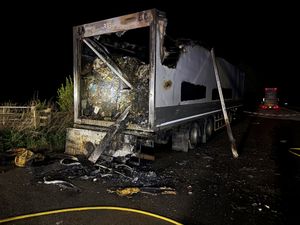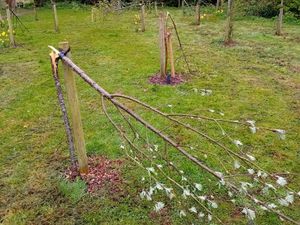Opponents give their reasons for objecting solar farm plans
There are a multitude of reasons why opponents of solar farm projects are so motivated to challenge plans for fields being covered in the energy creating objects.
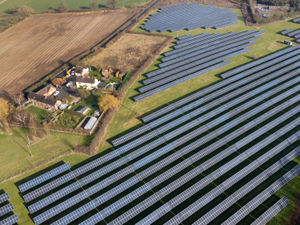
Loss of good agricultural land, the impact on landscape and prized walking areas, a defence of the democratic process, and a perceived loss of house price value are among the reasons opponents give to such renewable energy schemes.
Many opponents support the principle of having energy systems that are powered by sunlight but say the site chosen near them is "in the wrong place".
Telford & Wrekin Council is a big supporter of the principle of solar energy but has legally challenged a government decision to allow the Steeraway Solar Farm to go ahead close to the Wrekin, which it says is some of its "most strategically important and much valued landscape."
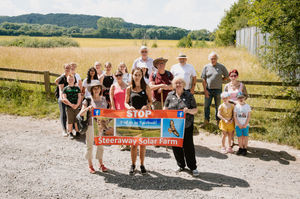
The council believes there are arguable legal grounds to challenge the government’s decision because the planning inspector who considered the case did not properly apply planning policies. Steeraway is also close to the New Works area where a solar farm was recommended for approval by a planning inspector but approved at a later stage.
Together, these sites extend to 230 acres, the equivalent to 174 football pitches and on the Steeraway site alone, with 77,000 solar panels, says the council.
The council's leader, Labour's Shaun Davies, said: “As a council, we fully support the production of green energy. We are one of just a handful of councils in the country to run our own successful solar farm and as a planning authority, we have approved many solar farms in appropriate locations across the borough, but green energy should not be prioritised blindly over green space. These farms need to be built in the right places."
For campaigners including Jocelyn Lewis, of the Stop Steeraway and New Works Industrial Solar 'Farms' group, one of the aspects that irks so much is an overturning of the local democratic process.
Parish councils, local campaigners, wildlife experts, walkers, and the borough's planning committee were united in opposition to New Works and Steeraway plans.
After permission was refused for the 99-acre solar farm at New Works between Arleston and Lawley a government appointed local planning inspector agreed with that view.
But a minister at the Department for Levelling Up, Housing and Communities overruled this in March 2023, giving the solar farm the green light.
The double whammy came in May 2023, when another appointed planning inspector approved the Steeraway Solar Farm development.
The council reckons that in making the decision the inspector considered the Secretary of State’s decision at New Works and relied on this heavily to justify the decision to approve the second development.
Jocelyn said: "The reasons were copied and pasted from one to the other."
If successful in judicial review it could mean that the decision making process has to take a step back.
Campaigners at Steeraway have joined a growing national organisation called the Solar Campaign Alliance which accepts that solar energy has a part to play in supplying renewable energy "where appropriate".
It is calling for no solar farm to be approved for development on greenfield land until their collective impact on the environment, biodiversity and food security is fully understood.
Campaigners at Kemberton, near Shifnal, have also joined the Solar Campaign Alliance and have objected to a plan for a solar farm covering an area equivalent to 28 football pitches.
Opposition there centres on the heritage of the area including Monarchs Way and the fact that Kemberton is first mentioned in the Domesday Book and where the present Church built in 1882 is the sixth, or could be the seventh, on the same site.
Jocelyn also supports a campaign being run by countryside organisation the CPRE which is calling for a "rooftop revolution".
Its website says: "Putting solar panels on rooftops across the country can help us to generate the clean electricity we need, while cutting our carbon emissions and sparing land for food, farming and nature."
They also want car parks to be used as "power stations" and add that putting panels on warehouses, schools, car parks and farm buildings, can be quickly roll out renewable energy "without harming wildlife, food security and landscapes."
https://www.cpre.org.uk/explainer/rooftop-solar-revolution-turning-possibility-into-reality/ https://takeaction.cpre.org.uk/page/127929/petition/
Jocelyn adds that there have been solar farm projects approved where there was little controversy
"There was one at Lilleshall and another near Shrewsbury where there was no significant opposition," she said.
"So people are accepting that solar energy is useful but they have to be in the right place."
In the south of the county, campaigners were disappointed when they recently lost a planning appeal for a solar farm at Squirrel Lane, Ledwych. There are a host of other solar farm plans either already granted or in the pipeline.
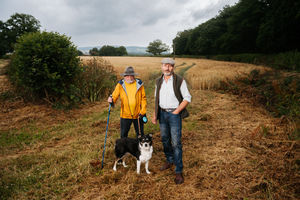
Councillor Andy Boddington, the Shropshire councillor for Ludlow North, and his Lib Dem colleague in the Clee division, farmer Richard Huffer, both had a focus on the loss of good quality farmland.
Councillor Boddington said: "The Southern Planning Committee has usually backed agriculture over energy production on the most productive land. The planning inspector was not convinced by our arguments, instead plumping for energy over food.
"Whether we should be growing food or generating energy is one of the big debates. The planning committee’s view was that in a county where agriculture is one of the most important industries, the best land for growing crops should be retained for food."
In that case, the inspector agreed that the solar farm would create harm to the landscape and views from the area of outstanding natural beauty. But he said this was more than balanced by production of renewable energy in line with national planning rules.
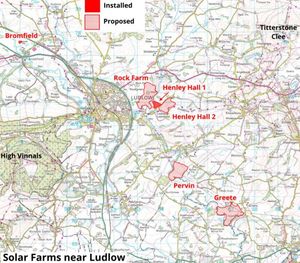
"As this inquiry proved, production of food only has weak support in government planning policy," he added.
Farmer-councillor Richard Huffer, Shropshire Councillor for Clee, said he has taken a wheat crop from these fields many times.
“We must generate renewable energy but we must also grow food," said Councillor Huffer.
“As members of the planning committee we need stronger on guidance on the balance between energy production and producing food. We don’t have much of a steer on that from anywhere.
“We need stronger local planning policies that clearly set apart land that is suitable for producing good quality crops from poor quality fields that could be used for solar farms."
He added that it is the second solar farm on Squirrel Lane, with a third at Rocks Farm in the pipeline. A solar farm has also been approved to the south at Greete.
"Others are being considered nearby, including at Pervin," he said.
“What do we want the working landscapes of South Shropshire to look like? What do we want to produce from them? Energy or food? These are questions of our time that need answering.”
One opponent of a solar farm in North Shropshire had a very personal reason for her objections.
She did not wish to be named but said she thought it would affect her property price. An elderly person, she was worried that it would affect the inheritance she leaves for her family.
"We had a valuation about three years ago and are about to get another one and am fearing the worst," she said.
She added that the panels, which shimmer silver in the sun, have spoiled her view and that of others and that the developer has broken promises to protect the views.
She added cynically: "Ninety-nine per cent of farmers do not do this for philanthropic ideals to help the country but for business reasons."

